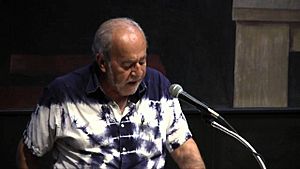Arif Dirlik facts for kids
Quick facts for kids
Arif Dirlik
|
|
|---|---|

Dirlik speaking at the New School in New York City in September 2014
|
|
| Born | 1940 |
| Died | December 1, 2017 (aged 76–77) Eugene, Oregon, United States
|
| Education |
|
| Scientific career | |
| Fields | History of China, postcolonialism, Marxism |
| Influences | Karl Marx, Mao Zedong, Fyodor Dostoyevsky |
Arif Dirlik (/ˈɑːrifˈdiːrlik/; November 23, 1940 – December 1, 2017) was a Turkish-American historian. He wrote many books and articles about the history and political ideas of modern China. He also explored big topics like how the world is connected (globalization) and how countries deal with their past after being ruled by others (post-colonialism).
Contents
Biography
Arif Dirlik first came to the United States to study science at the University of Rochester. However, he soon became very interested in Chinese history instead. He earned his PhD in history in 1973. His main influences were important thinkers like Karl Marx, Mao Zedong, and the writer Fyodor Dostoyevsky.
After he officially retired, Dirlik lived in Eugene, Oregon. He also held special visiting professor roles at universities in places like Delhi, India, and Beijing, China.
Career and Teaching
Dirlik taught history and anthropology for many years. He spent thirty years as a professor at Duke University. Later, he moved to the University of Oregon in 2001. There, he was a special professor of social science and directed a center for critical thinking.
He also worked at the Chinese University of Hong Kong. Dirlik was a visiting professor at many other universities around the world. These included the University of British Columbia in Canada and the University of California, Los Angeles in the U.S. He also taught in Paris, France, and at Soka University of America.
Dirlik was part of the editorial teams for many academic journals. These journals published articles on topics like Chinese studies and global issues. His writings have been translated into several languages, including Chinese, Japanese, and French.
His Ideas on History
Dirlik had strong opinions about how we understand history. He believed that studying history is very important. He said it helps us make sense of the past and understand the world today.
Critiques of Global Ideas
Dirlik also looked closely at different ideas about how the world works.
Postcolonial Studies
He questioned some ideas in "postcolonial studies." This field looks at the effects of colonialism (when one country rules another). Dirlik worried that some scholars from former colonies might become too focused on Western academic ideas. He felt they might not truly represent the people in their home countries.
Beijing Consensus
Dirlik was also critical of the "Beijing Consensus." This idea suggests that China's way of developing its economy could be a model for other developing countries. Dirlik argued that this model often relied on using China's large workforce. He pointed out that foreign countries played a big role in this economic growth.
World History
A historian named Jerry H. Bentley summarized Dirlik's views on "world history." Dirlik believed that world history studies sometimes made global capitalism seem like a natural or unavoidable part of human life. He also thought that these studies could still focus too much on European ideas, even when trying to look at the whole world. Bentley agreed that Dirlik raised important points, but felt he sometimes went too far in his criticisms.
Selected Books
- 1978. Revolution and History: The Origins of Marxist Historiography in China, 1919–1937. University of California Press.
- 1989. The Origins of Chinese Communism. Oxford University Press.
- 1991. Anarchism in the Chinese Revolution. University of California Press.
- 1994. After the Revolution: Waking to Global Capitalism. Wesleyan University Press.
- 1997. The Postcolonial Aura: Third World Criticism in the Age of Global Capitalism. Westview Press.
- 2001. Postmodernity's Histories: The Past as Legacy and Project. Rowman and Littlefield.
- 2005. Marxism in the Chinese Revolution. Rowman and Littlefield.
- 2017. Complicities: The People's Republic of China in Global Capitalism. Prickly Paradigm Press.

